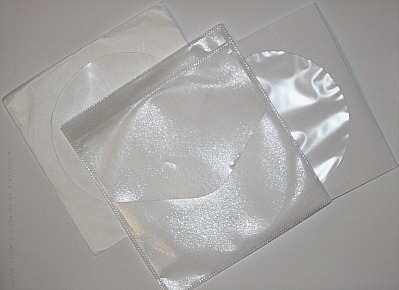- Home
- Storage of Discs
- CD Sleeves
CD Sleeves for Disc Storage
CD sleeves or DVD and Blu-ray sleeves are often used to store optical disc media because they are cheap and space saving.
However, storage in CD paper or plastic sleeves, or any other kind of optical disc sleeve can cause damage or deterioration. It is worthy to note that the ISO standard for the storage of optical disc media does not recommend their use.
CD Sleeves Provide No Physical Protection
There are several reasons why the use of sleeves for storing CDs, DVDs, and Blu-rays is not a good idea. First, a sleeve provides no physical protection for the disc stored inside of it. A CD or other optical disc can be easily bent when stored in a sleeve. Handling of the disc in the sleeve always will exert pressure on the disc and if it is dropped, then cracking or breakage is a possibility because the sleeve provides no impact resistance.

Scratching of Disc Surfaces
Another significant problem with the use of DVD or CD sleeves is scratching of disc surfaces. Scratching on the surfaces of an optical disc may lead to playability problems and therefore it is very important to prevent scratches from occurring as much as possible.
When discs are stored in sleeves, the disc surfaces are in constant contact with the sleeve and every time a disc is removed or inserted into the sleeve, scratching occurs. The scratches can be more serious when debris is trapped in the sleeve and rubs against the disc surfaces.
Contamination of Optical Disc
Contamination of disc surfaces can also occur because of the use of sleeves. The contamination is usually from debris that comes off the sleeve, especially when paper sleeves are used. It can also be from dust or dirt present in the environment or from fingerprints, which often end up of the disc because of the way in which a disc is removed from the sleeve.
Chemical Reactivity
The chemical reactivity of the sleeve and how it chemically interacts with the CD or DVD or Blu-ray discs are other issues. Sleeves can be made of paper, cardboard, PVC, polyethylene, polyester, Tyvek, or combinations of these or other materials. Some of these materials are chemically inert whereas others are not. Over time, materials that are reactive will degrade and release agents that will chemically damage CDs and DVDs and may leave deposits of degradation products on the surfaces of a disc. This is evident in the following photograph.

The poor quality plastic sleeve has chemically changed over time and left a substance on the surface of the CD. In some cases, the deposit can be wiped away. However, in many instances, the substance will penetrate into the disc and removal becomes extremely difficult, if not impossible. This is the situation for the CD shown in the image.
Without proper chemical analyses, it is difficult to determine if a particular CD sleeve will damage a disc or not. Therefore, this is another reason to avoid the use of sleeves for storing CDs, DVDs, and other optical disc media.
Optical Disc Storage Albums and Sleeves
Various storage albums are available for optical disc or CD storage. These may or may not have a hard exterior shell. If the exterior is rigid then this will provide some physical protection for the discs stored inside. However, within the storage album the discs are stored in some form of sleeve. Therefore, for the reasons mentioned above, the use of these types of storage enclosures should also be avoided.